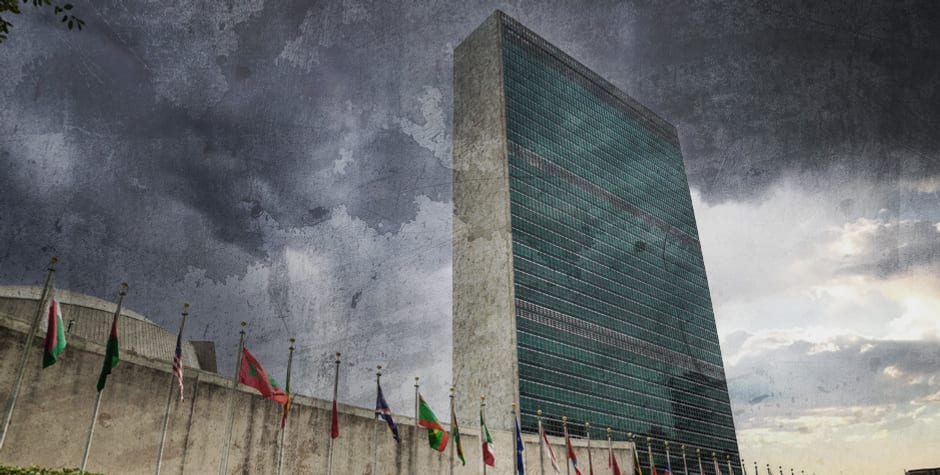UN General Assembly “Demands” That Israel End Its “Unlawful Presence in the Occupied Palestinian Territory” Within 12 Months
The United Nations General Assembly (UNGA) recently passed a resolution calling upon the international community to “ensure full implementation of the advisory opinion” of the International Court of Justice (ICJ) in which the ICJ stated that Israel’s continued presence in the Gaza Strip, the West Bank (Judea and Samaria), and East Jerusalem (the so-called “Occupied Palestinian Territory”) is unlawful. The resolution was adopted by 124 votes in favor, 14 against, and 43 abstentions.
The UNGA resolution “demands” that Israel end its “unlawful presence in the Occupied Palestinian Territory . . . and do so no later than 12 months from the adoption of the present resolution.” Except, neither the UNGA nor the ICJ (through an advisory opinion) can make “demands” of a binding nature.
ICJ advisory opinions are exactly that—advisory, i.e., non-binding, and UNGA resolutions are also not legally binding. The UNGA is only authorized to make recommendations. Yet the recent resolution uses terminology and portrays the ICJ advisory opinion as if both were legally binding and created legal obligations not only for Israel but for the international community. Those who are not familiar with the legal value of the UNGA resolutions and ICJ advisory opinions would take them as binding proclamations of law and facts.
This is “lawfare” in its full display. It does not matter what the law is as long as it appears that Israel is violating some law, which in turn garners the sympathy of the international community for the Palestinian cause. While the Palestinian Authority (PA) uses lawfare to garner political support, Hamas uses similar tactics in the armed conflict to garner international sympathy. Its October 7, 2023, attack was a plan to invite a strong military response from Israel, put innocent civilians in harm’s way to be killed, and then have the international community condemn Israel.
Note that the UNGA resolution does not even mention Hamas, the Palestinian Islamic Jihad, or the vile and brutal attack of October 7. It does not mention the indiscriminate murders of innocent civilians (including babies), brutal rapes, mutilations, and desecration of bodies by Hamas—all constituting war crimes, crimes against humanity, and genocide.
Additionally, both the ICJ advisory opinion and the UNGA resolution are based on false premises and false presumptions. They begin by presuming, albeit incorrectly, that the Gaza Strip, the so-called West Bank, and East Jerusalem constitute a “State of Palestine.” Yet no evidence or legal principles are ever provided to support the claim that such a state exists or that those areas form such a state. Once this flawed presumption is made, then it becomes easy to allege that Israel is unlawfully occupying those areas.
Further, the ICJ advisory opinion and the UNGA resolution are devoid of any legal analysis regarding the reasons for Israel’s presence in the so-called “occupied” territories. Israel has a competing legal claim to those areas based on the League of Nations Mandate for Palestine. As such, Israel is not illegally occupying those areas. The often-cited 1947 UNGA Resolution 181(II) (which suggested a two-state solution) as a basis for the “Palestinian state” was never implemented because the Arabs rejected it. And as such, no Palestinian state was ever created.
Moreover, the ICJ advisory opinion and the UNGA resolution are also devoid of the threat that Israel faces to its existence from the Gaza Strip and the West Bank. Thousands of rockets that are indiscriminately fired toward Israel every year, suicide bombings, shootings, mortar fire, and the recent October 7 attack all show there exists an undeniable military necessity for the security of Israel. As such, under the Law of Armed Conflict, also known as International Humanitarian Law, Israel’s presence and its actions vis-à-vis the Gaza Strip and the West Bank are lawful. Succumbing to the “demands” of the U.N. bodies would mean the destruction of Israel, which Israel cannot allow.
At the ACLJ, we are fighting back. We recently filed two separate reports with the U.N. Human Rights Council (UNHRC), asking it to hold United Nations Relief and Works Agency for Palestine Refugees (UNRWA) employees who participated in the attack of October 7 responsible and establish measures to counter the rising incidents of antisemitism worldwide, including antisemitic statements at the U.N.
We also recently filed an amicus brief with the ICC, arguing that the ICC does not have any jurisdiction to investigate, issue arrest warrants against, or try Israeli nationals. It is rumored that the ICC will soon announce a decision on the ICC Prosecutor’s application seeking permission from the Court to issue arrest warrants against Prime Minister Netanyahu and Defense Minister Gallant. We stand ready to defend our ally Israel.
